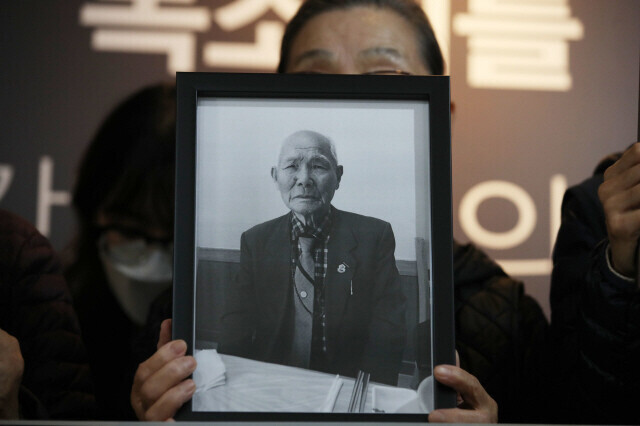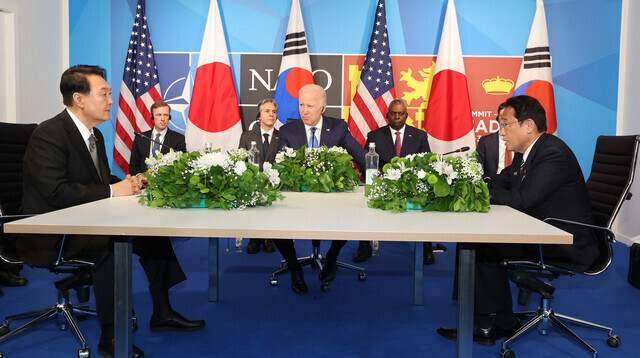hankyoreh
Links to other country sites 다른 나라 사이트 링크
S. Korean public-private task force on forced labor by Japan off to rocky start

The public-private consultative group that the South Korean government is launching to resolve the issue of compensation for labor conscripts during the Japanese colonial occupation will hold its first meeting on Monday.
But the group is facing trouble before it even gets off the ground, with some advocacy groups for victims criticizing the government for a lack of transparency and openness in setting up the group. Advocates say victims must not be forced to make concessions under the pretext of improving Korea-Japan relations, drawing parallels to the hastily arranged comfort women agreement in 2015.
The consultative group will be chaired by Cho Hyun-dong, the first vice minister of foreign affairs, with experts and academics among its members.
The ostensible reason the government has set up the group as it seeks a solution to the forced labor issue is that the Korean Supreme Court’s final decision about liquidating the domestic assets of Japanese companies implicated in war crimes during the colonial period is expected to arrive in August or September.
After the Supreme Court ruled in October 2018 that Koreans conscripted for labor should be paid damages, Japan described the ruling as a “violation of international law” and said that “forcibly liquidating the assets would mean a rupture in Korea-Japan relations.”
But on a more fundamental level, Korean President Yoon Suk-yeol regards boosting security cooperation between Korea, the US and Japan as critical to his efforts to counter the threat of North Korea’s nuclear weapons and missile programs through foreign policy and national security policy — and boosting security cooperation, he thinks, requires better relations with Japan.

The Japanese government has said that resolving the issue of forced labor is a prerequisite for normalizing relations with Korea, which have been at an impasse since the Korean Supreme Court’s decision. Japan has also pressed the Korean government to come up with a solution.
In effect, the Korean government has bought into the Japanese government’s argument that the forced labor issue has to be resolved to improve Korea-Japan relations, which itself is needed to strengthen trilateral security cooperation with the US.
There are differences between how Korea, the US and Japan regard trilateral security cooperation.
When leaders from the three countries held their first summit in nearly five years on the sidelines of the NATO summit in Madrid on Wednesday, the Americans mentioned the importance of trilateral cooperation across the Indo-Pacific, including on the North Korean nuclear issue. That suggests expanding trilateral security cooperation beyond the Korean Peninsula and throughout the Indo-Pacific to counter China.
Japan has highlighted joint military exercises with Korea and the US and its exercise of the right of collective self-defense. That suggests that while Japan basically agrees with the US’ plan of expanding trilateral security cooperation beyond the Korean Peninsula, Japan hopes to achieve its own security objectives, which include strengthening its defense capabilities.
In contrast, South Korea stressed trilateral security cooperation with the goal of responding to the North Korean nuclear issue. In a document released shortly after the summit, South Korea’s presidential office said, “The three leaders agree that North Korea’s continuing progress on its nuclear weapon and missile programs presents a serious threat not only to the Korean Peninsula but to East Asia and the international community. Security cooperation between South Korea, the US and Japan was restored as of today.”
The presidential office apparently means to underscore how Yoon is different from his predecessor by claiming that the security cooperation system between Korea, the US and Japan that was weakened by the impasse in Korea-Japan relations under former President Moon Jae-in has been normalized now that Yoon is in office.
By focusing the claim about restoring trilateral security cooperation on its domestic political effect, the Yoon administration ultimately seems to be rushing to set up a public-private consultative group that can serve as a solution for the forced labor issue that Japan says is a prerequisite for improving relations with Korea.
When the Citizens’ Group on Forced Labor During the Japanese Colonial Period announced in a press conference on Wednesday that it would turn down the government’s request to attend meetings of the public-private consultative group, that decision was driven by fear that the citizens’ group would be used to whitewash the proceedings of the consultative group.
Experts speak of the need for a “two-track approach” that could deal with Korea-US-Japan security cooperation separately from improving relations with Japan.
“There are many aspects of trilateral security cooperation beyond the Korean Peninsula that ought to be carefully examined in light of the national interest. While trilateral security cooperation on responding to North Korea’s nuclear weapon and missile program may be urgent, restoring trilateral cooperation in other areas may not make an appreciable difference,” said Lee Ki-tae, an expert on Japanese foreign policy and national security policy and the head of the peace research division at the Korea Institute for National Unification.
In other words, improving relations with Japan is no excuse for the government to cobble together a solution for compensating victims of forced labor without first achieving a public consensus.
By Jung In-hwan, staff reporter
Please direct questions or comments to [english@hani.co.kr]

Editorial・opinion
![[Column] Welcome to the president’s pity party [Column] Welcome to the president’s pity party](https://flexible.img.hani.co.kr/flexible/normal/500/300/imgdb/original/2024/0515/3917157400447943.jpg) [Column] Welcome to the president’s pity party
[Column] Welcome to the president’s pity party![[Editorial] Korea must respond firmly to Japan’s attempt to usurp Line [Editorial] Korea must respond firmly to Japan’s attempt to usurp Line](https://flexible.img.hani.co.kr/flexible/normal/500/300/imgdb/original/2024/0514/2317156736305813.jpg) [Editorial] Korea must respond firmly to Japan’s attempt to usurp Line
[Editorial] Korea must respond firmly to Japan’s attempt to usurp Line- [Editorial] Transfers of prosecutors investigating Korea’s first lady send chilling message
- [Column] Will Seoul’s ties with Moscow really recover on their own?
- [Column] Samsung’s ‘lost decade’ and Lee Jae-yong’s mismatched chopsticks
- [Correspondent’s column] The real reason the US is worried about Chinese ‘overcapacity’
- [Editorial] Yoon’s gesture at communication only highlights his reluctance to change
- [Editorial] Perilous stakes of Trump’s rhetoric around US troop pullout from Korea
- [Guest essay] Preventing Korean Peninsula from becoming front line of new cold war
- [Column] The state is back — but is it in business?
Most viewed articles
- 1[Editorial] Korea must respond firmly to Japan’s attempt to usurp Line
- 2[Editorial] Transfers of prosecutors investigating Korea’s first lady send chilling message
- 3[Column] Welcome to the president’s pity party
- 4Second suspect nabbed for gruesome murder of Korean in Thailand, 1 remains at large
- 5Could Korea’s Naver lose control of Line to Japan?
- 6Major personnel shuffle reassigns prosecutors leading investigations into Korea’s first lady
- 7Naver’s union calls for action from government over possible Japanese buyout of Line
- 8Unexpected rate of AI development requires timely discussion of side effects
- 9US has always pulled troops from Korea unilaterally — is Yoon prepared for it to happen again?
- 10China gains 2 new ambassadors to Korea in form of newborn panda cubs